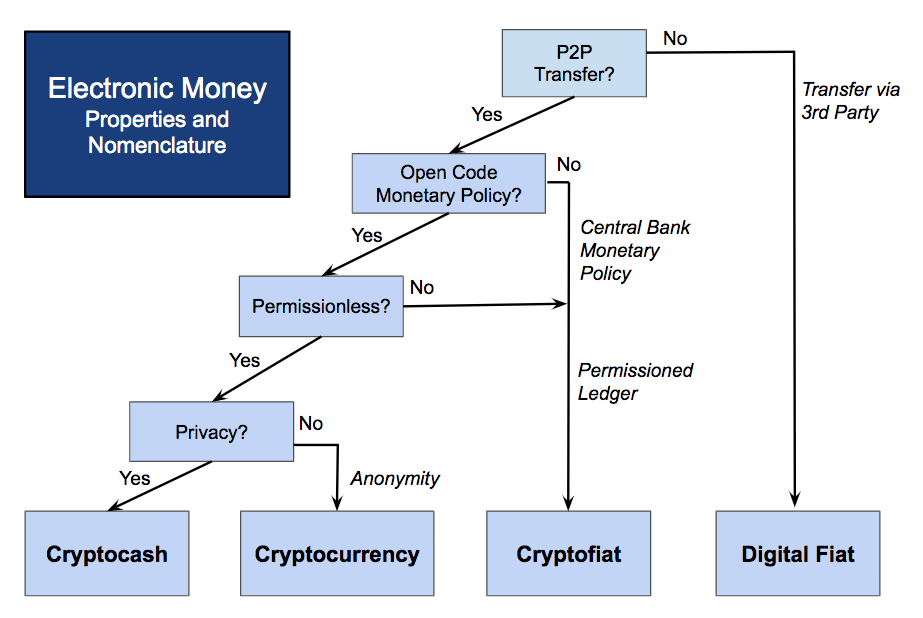On the future of electronic money: What will the currency system look like in 2070?
Author: Lan Love encryption monetary investment company founder Assets Pty Ltd
Compilation: Share Finance Neo
Source: Shared Finance
Preface
- Blockchain Science Fiction: "Computing Power" (Part 1)
- KPMG launches KMPG Origin, a blockchain traceability platform, to improve transparency in multiple industries including financial services
- National University of Singapore Visiting Professor Bai Shifang: FinTech Promotes Tech Finance
Humans change their currency every century or so (see Bitcoin standards and currency history). This change usually does not accompany the Big Bang. It is more like a gradual process. The new system will be in decades. Replace traditional systems.
For the purposes of this article, the starting point of the current monetary system was the Bretton Woods Conference of 1944. The most important change in this system was the abolition of the gold standard by President Nixon in 1971, which led to the slow disintegration of this system, and we are still witnessing this process. The new monetary system began with the release of the Bitcoin white paper on October 31, 2008. So today we have a fiat currency based system and a password based system. The two systems are very different, but both are designed to fulfill the basic functions of money: value storage, means of exchange, and units of account.
There is nothing simpler than the new and old systems. We will not switch from one system to another anytime soon. There are many such systems between these two systems.
Imagine the international and domestic currency / payment system in 2070. By then, these old and new systems will merge and interoperate, providing governments, organizations, and individuals with more funding options than they do now. But what does this look like? This article presents one possible outcome.
Classification of electronic money
Part of the purpose of this article is to propose some classifications / nomenclature for the different types of electronic money that are emerging. It is also important for this article to understand the meaning of these words.
I use four characteristics to derive four types of electronic money.
Transmission path
The term "person-to-person" (P2P) refers to the transfer of value directly between two parties without the need for a third party.
If the transmission path is not P2P, it is assumed to be through a third party, usually a bank.
Monetary Policy
Open code monetary policy refers to monetary policy embedded in open source computer code.
If it is not an open code monetary policy, it is considered a monetary policy and is managed by a trusted independent central bank or other central group.
No license system
The term "unlicensed" means that anyone can join or use the system without permission from the authentication process,
If it is not an unlicensed system, then it is considered to be a licensed system.
Degree of privacy
The term "private" refers to transactions and balances that are completely invisible, except for the parties involved in the transaction.
The word "anonymous" means that transactions can be tracked and the account balance can be seen, but the parties behind the account are difficult to identify.
From these characteristics, I define the existence of four types of electronic money: Digital Fiat, Cryptofiat, Cryptocurrency, and Cryptocash. These definitions are shown in the flowchart below.

Privacy vs control
Confirming a person's identity without compromising personal privacy is one of the most important unresolved issues in the digital age.
"Know Your Customer" (KYC) and "Anti-Money Laundering Law" (AML) are designed to protect society by cutting off access to funds required by socially wrongdoers. These laws are a violation of privacy, on better grounds for a safer society.
In a democratized economy, the state outsources the collection of transactional data to the banking sector, which then passes the data to the national sector, who analyzes the data and labels it to national security agencies.
The effectiveness of this system is questionable. I have no intention to delve into large-scale money laundering cases against the world's largest banks. If the reader is interested, a simple Google search will reveal everything.
Many banks' failure to enforce existing "anti-money laundering" laws has led the government to increase investment in these laws and make them more common, such as laws prohibiting cash transactions.
The government likes to say that Bitcoin is used to finance terrorists. At the same time, I see that many governments see blockchain technology as a great tool for managing and enforcing "anti-money laundering" laws, and even controlling other aspects of citizen life.
National arms race on blockchain and Cryptofiat
In the second half of 2019, we witnessed the start of a race to become the first major economy to issue its sovereign currency in digital form and leverage the potential of blockchain technology. I call it blockchain war.
Initially, central banks mocked cryptocurrencies as Ponzi schemes and fraud. Now that they understand the underlying technology, they are racing to be the first to use it to serve their currency. Governments, regulators and central banks are now embracing the "blockchain rather than bitcoin" (first heard in 2014-16) moment.
By far the most ambitious country is China. The People's Bank of China will release a CYN Cryptofiat as soon as possible, and the government will adopt blockchain technology wherever feasible.
Following China is Russia. Putin views blockchain as a security issue at the national level and has given many speeches explaining Russia's intention to dominate the field.
The Libra coin on Facebook has been an important part of the consciousness of activating this technology in parliaments and central banks around the world. No country has the ability to deliver crypto commands to more than 2.7 billion people like Facebook. Facebook has gone beyond newspapers, television, radio, parliament and all other traditional platforms to become the world's most powerful uncensored opinion shaper. It also has more human data than any country. This awakened the US Congress. At the Libra hearing in October 2019, Maxine Waters issued the following statement:
"… Mr. Zuckerberg, the freedom of speech you preach does not sound real. 2.7 billion people use your product every month. This is more than a third of the world's population. This is a huge number. It's too big, and anyone who hears this list knows that maybe you believe you are above the law, and it looks like you are actively expanding the size of your company and are willing to get what you want Trample anyone, including your competitors, women, people of color, your own users, and even our democracy. I have outlined all of these issues. Given the size and reach of the company, we should be clear why we Your plan to build a global digital currency that may challenge the dollar is a serious concern. "
To be sure, authoritative governments will not adopt the unreviewed, unlicensed, and privacy aspects of this technology. They will seek to strengthen control of their economy and citizens by strengthening control over their citizens' money. However, I do not expect that our great democracies will adopt egalitarianism and the technical aspects of strengthening democracy. This will be a race to see who can introduce a licensed, censorable, and centralized encryption law.
However, public blockchain technology is already too advanced for countries to shut it down. I expect that public blockchain ecosystems and private blockchain ecosystems will develop in a manner similar to intranet and Internet ecosystems.
In defending the Facebook / Libra initiative, Mark Zuckerberg argued that the US government should encourage the use of such technologies at home to compete with China, Russia and other countries that are competing to dominate.
Dedollarization of global trade
State control of citizens' money is one of the driving forces for Cryptofiat's development. Another is the opportunity to replace the US dollar as the world's base currency. The theory is that by making a country's currency (such as the RMB) more accessible and transferable, it can replace the US dollar as the default global currency. This is a huge opportunity in Third World economies (US dollar banknotes can be used as the default local currency) and countries participating in the “Belt and Road” initiative (China may insist on using RMB for trade settlement).
Russia and Europe also want to reduce their reliance on the US dollar and make some choices in global settlements, such as the euro cryptocurrency and the ruble cryptocurrency. In short, once all G20 + countries have issued cryptocurrencies, currency competition among member states will significantly increase and may become more transparent. This will lead to better pricing of Cryptofiat, which is likely to improve domestic economic efficiency. But in the end, we will still make a country's cryptocurrency the default global currency.
By 2025/30, I can see that the balance theory of "enemies are friends" is beginning to change the way countries see cryptocurrencies. In this regard, the theoretical work is as follows:
1.Each country in G20 + does not want the cryptocurrency of another country to become the default global currency;
2.Every country in G20 + does not like Bitcoin or other cryptocurrencies; but
3.Each country in G20 + wants Bitcoin or other cryptocurrencies to be the default global currency, not the cryptocurrencies of other countries.
The idea is to use cryptocurrencies (such as BTC) as the basis for Cryptofiat's valuation. So it corresponds to BTC / USD, BTC / CNY, BTC / EUR, BTC / RUB, etc. (these trading pairs already exist in the crypto market).
There are many attractive features, the most important of which is that none of the G20 member countries can control the value of bitcoin. They can only control the value of bitcoin through the money supply and domestic economic strength. This is not out of reach. Christine Lagarde, the current ECB president, has said the same thing many times during his tenure as president of the International Monetary Fund.
Bitcoin evangelist Andreas Antonopolos said that Bitcoin cannot be blocked by any country. He may be technically right, but it can be made illegal? An interesting question that arises is … the ban on cryptocurrencies Is it executable, or will it be as problematic as drinking? The answer is we don't know. But in general, the ban seems unlikely to be successful globally, and, like alcohol, trying to ban may accelerate acceptance.
The answer to the above privacy and control questions will be found in artificial intelligence and machine learning technologies that will scan for illegal activities on public networks. A search warrant generated by the robot but limited in time will open a window to a private network to explore clues and investigate suspicious activity.
Biometric technology and minimum standards will allow previously unbanked or undocumented people to join public networks, access cryptocurrencies, Cryptofiat, and crypto cash, as well as any tagged assets or irreplaceable tokens.
Cryptocurrencies will coexist
Millennials are growing up in a digital native environment, they peek into the era of blockchain, but Generation X will grow up in a cryptographic native environment, which will be partly due to the adoption of blockchain technology by governments and enterprises in the next decade.
At the same time, the national arms race is taking place, and the development of the cryptocurrency and cryptocurrency fields at the corporate and retail levels is proceeding at an alarming rate. The speed far exceeds the country. This situation will continue.
By around 2025/30, all central banks will issue crypto orders, and they will compete with each other as always, albeit in a more transparent environment. Encrypted user interface issues will be well resolved. Crypto wallets will be as ubiquitous as mobile phones, and point-of-sale machines everywhere will accept all types of encryption as normal business.
So people will have choices and they will be able to see the currency value in their wallets fluctuate 24/7. At this point, people's choices are not only Cryptofiat versus Cryptofiat, but cryptocurrency / cryptocurrency pairs Cryptofiat and the entire range of crypto assets.
This choice is not only about the exchange rate between currencies (the exchange rate should reflect the value of the underlying economy), but also the rate of return that the deposit currency can enjoy. In the case of Cryptofiat, this will be the interest rate of a bank or commercial bond, and in the case of a cryptocurrency, it will be through a loan or the establishment of a cryptocurrency. In fact, people can make this choice today (November 2019), and the yields are very different. The average rate of return for cryptocurrencies is in the double-digit range, while interest rates in the fiat world are negative.
I have no doubt that cryptocurrencies will coexist with cryptocurrencies. Humans are tribal in nature and love their country. I don't see this change. But people will also be self-centered, and there will be a powerful force to attract people to invest in assets that maintain value and yield good returns. This increasing competition will put pressure on countries to manage their countries responsibly.
2070
2070 is too far away … the development of the Internet, the popularity of mobile phones, and the growth of FANG (Facebook, Amazon, Netflix, and Alphabet's Google.) All of this happened in about 20 years. An example of how fast things change. Change is getting faster and faster. A more realistic time is 2040 or earlier. By that time, my predictions are as follows:
1. All G20 + countries will issue encryption orders, which citizens can use at any time (some countries may restrict);
2.G20 + countries will continue to control monetary policy as they have introduced this concept (but to increase transparency and speed);
3. Global trade will be largely de-dollarized. If it is not de-dollarized, it will become a US dollar cryptocurrency. The most popular currency for global trade will be one or more cryptocurrencies (imo BTC, ETH and Hbar);
4.Any person who owns a mobile phone can access all Cryptofiat, cryptocurrencies, crypto cash and any form of crypto assets through the crypto wallet of his mobile phone;
5. From encryption certificates to cryptocurrencies to encrypted assets, it will be seamless, instant and cost effective.
I seem to be catering to others by reaching the conclusion that "everyone is a winner": all forms of money will exist; all blockchains will work; and everyone will get better funding. But I believe it is possible. If we use the Internet as a comparison, we have hundreds of Internet service providers, we have public access and interoperability, and we have a penetration rate of more than 50%. The internet is a pretty good thing. Web 3.0 (sometimes called blockchain technology) will be much better than the Internet, but I am an optimist. I think we will wait and see.
We will continue to update Blocking; if you have any questions or suggestions, please contact us!
Was this article helpful?
93 out of 132 found this helpful
Related articles
- Shock! No one in Japan uses Bitcoin! | 8 Questions
- Ethereum 2.0 client enters code security audit phase, testnet will be released next week
- Can EOS 'centralization problem be solved by sharding?
- Why do more people prefer deflationary cryptocurrencies?
- QKL123 market analysis | Look at the degree of price deviation through these two indicators (1129)
- China Blockchain Enterprise Development Census Report: About 1,000 businesses that have actually conducted business
- The most notorious Bitcoin money laundering case in history, new recordings reveal Russian agents seized $ 450 million in BTC-e cryptocurrency




